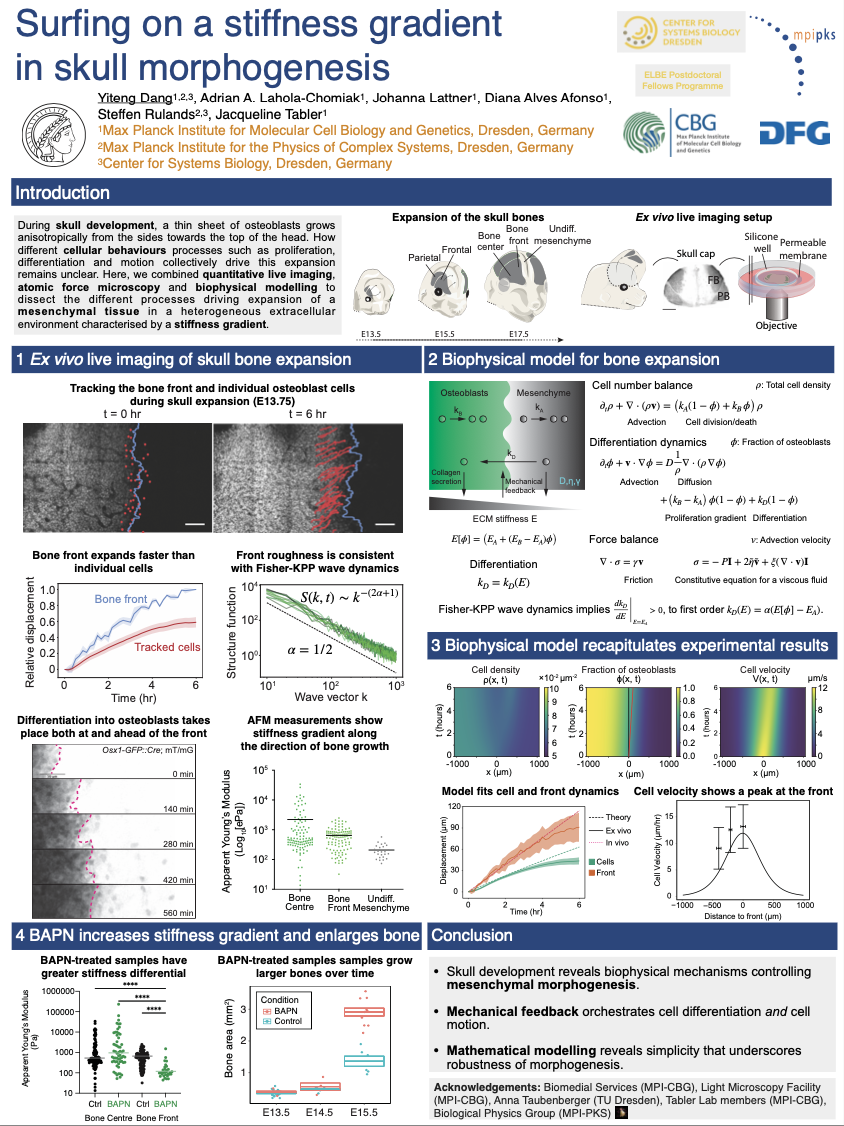The Cell and Developmental Biology Subgroup has been highlighting the poster prize winners of the 2022 European Conference on Mathematical and Theoretical Biology in a series of blog posts. There were three recipients of poster prizes: Jelle van der Voort, Svetlana Petrenko, and Yiteng Dang (this post). We hear from Yiteng Dang here.
Yiteng Dang, Postdoctoral Fellow at the Max Planck Institute for the Physics of Complex Systems and the Max Planck Institute for Molecular Cell Biology and Genetics, Germany
Prize poster: Surfing on a stiffness gradient in skull morphogenesis
About Yiteng:
Yiteng Dang is an ELBE Postdoctoral Fellow at the Center for Systems Biology Dresden (CSBD), the Max Planck Institute for the Physics of Complex Systems (MPI-PKS) and the Max Planck Institute for Molecular Cell Biology and Genetics (MPI-CBG). He currently works with the theoretical physics group of Steffen Rulands (MPI-PKS) and the developmental biology lab of Jacqueline Tabler (MPI-CBG). After studying physics and mathematics for his bachelor’s at Utrecht University, he received a master’s in applied maths and theoretical physics (Part III of the Mathematical Tripos) at the University of Cambridge and did the second year of the ICPF master with specialisation in quantum physics at ENS Paris. For his PhD, he joined the lab of Hyun Youk at the TU Delft, where he developed theoretical frameworks for individual-based models for pattern formation and collective dynamics in systems of communicating cells. Overall, his research focuses on understanding biology through theoretical and computational approaches inspired by physics, in particular in the context of multicellular systems and during development. His current research has two major directions: (1) understanding morphogenesis by developing biophysical theories and analysing quantitative imaging data, (2) using computational approaches to study cell fate decisions from single-cell genomics and lineage tracing data. He collaborates with multiple experimental biology labs on interdisciplinary projects that combine quantitative experiments with biophysics, computational modelling and bioinformatics.
The work on his poster describes a project on skull morphogenesis in collaboration with experimental biologists in the Tabler lab (MPI-CBG), where they studied how cellular behaviours drive expansion of the frontal bones during mouse embryonic development. This revealed that bone expansion during mouse skull development is driven by mechanical feedback that simultaneously directs cell motion and a wave of differentiation. Contrary to previous dogma, they determined that expansion is not generated by collective cell migration, but is instead coordinated by an emergent stiffness gradient. Altogether, their work proposes a mechanism for anisotropic tissue growth and may contribute in elucidating the complex interplay between chemistry and mechanics driving morphogenesis.

Yiteng Dang's poster titled 'Surfing on a stiffness gradient in skull morphogenesis' received a prize at ECMTB/SMB 2022.